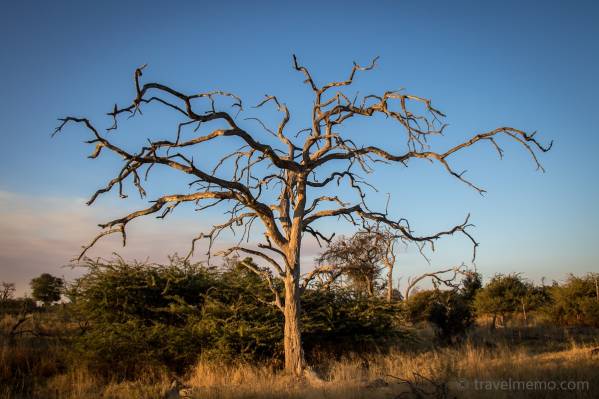We were particularly keen on experiencing the Moremi Game Reserve: contrary to a Chobe River safari, here you have to work hard for sightings of the animals camouflaged in their natural surroundings. Unless you’re talking about rhinos or elephants, that is…
Moremi is located in the eastern Okavango Delta. It has just about everything that makes for an unforgettable safari. For many people, it ranks at the absolute top among Africa’s wildlife regions.
In this reserve, too, dead trees are part of the picturesque background formed by a varied landscape. And then, to top it all, the setting sun paints the whole scene in a rich variety of colors…
The density of lions and leopards here is astonishing, given especially the latter’s reputation for elusiveness. They hunt the herds of buffaloes, giraffes, elephants, zebras and the ubiquitous impalas, the McDonalds of the bush, that roam everywhere here.
Cheek by jowl with leopards
We are “camping out” here in the unbelievable Little Mombo Camp (click the link for our report on this Wilderness Safari premium camp). As we’ve learned by now, calling this “camping” is hugely stretching the meaning of the word. But then we so seldom indulge…
We spent two days out in the wilderness with our tall guide Sevara. As in other game reserves, here, too, the guides keep in touch by radio to help locate particular kinds of wildlife at a given moment. No sooner does Sevara learn that a leopard has been sighted in our vicinity, we take off as if bitten by a tarantula (no, they live in South American jungles only).
This scrambling can even happen during a relaxing sundowner: the ice chest is snatched from the radiator rack and hastily stowed in the safari jeep while we clamber into our raised seats — camera in one hand, gin and tonic in the other. Then Sevara puts the pedal to the medal and roars off, raising a towering dust cloud in our wake.
Hold on for dear life! …
… now becomes the motto. In the event, we at most have saved a few drops of the gin and tonic by the time we come to a stop; the rest of it the ants and other crawlies are probably lapping up with delight.
Fantastic! The hair-raising drive was worth it! There really is a leopardess romping around here with her youngster. The young one is still a little clumsy and looking a little uncoordinated as it pads around.
Cheekily, he leaps up on a dead tree trunk using his mother’s shoulders as springboard before making his way higher up into the tree. As we know, kids just don’t know when to be scared.
The inexperienced little guy scrambles around way high above the ground on the dry brittle wood. Let’s hope that turns out all right! But I steadily aim my telephoto lens just in case…my companion Daniel from Hong Kong acts on the same instinct. This is not something to be missed!
Almost as if by a (nature’s) miracle, nobody winds up getting hurt during the climb. But when hunger intrudes, playtime is over. Mama leopard lets her cub know with an unmistakable snarl that she doesn’t want any of his maladroit help while she goes hunting. It’s tough enough as it is.
But it is actually even more complicated than it looks. This is because, once the leopardess has begun to stalk its target, the squirrels, birds, or baboons take note and sound the alarm in half the bush with their howling or whistling. That causes the leopardess to have to patiently pause in her ambush until the general excitement subsides again and she can get on with it…all this while we also wait just as patiently. With cameras at the ready.
We thought we would get to see it happening live when the leopardess reassumes the hunting stance on her lookout, her ears flattening against her head. But just when she gathers herself silently and lithely on a desiccated treelimb and is about to leap into the attack…
… the rotted wood collapses with a loud crack under her and spooks friend and foe both… and gone is the prey. Empty claws again… still hungry, she moves off for the next try.
Rhinos in the Moremi Game Reserve
Near threatened white rhinos and endangered black rhinos were brought into the private Moremi Reserve from South Africa and successfully reintroduced into the wild here. Rhino poaching is a big problem in southern Africa: conservationists and environmental activists speak of a “war for the horn.” Powdered rhino horn traditionally has been considered a wonder drug and aphrodisiac in China and Vietnam.
Hunting is prohibited across the board in Botswana. Poachers are tracked down by the military and subject to harsh punishment. Not even the omnipresent warthogs may be hunted. Which is why, in the towns, people lure them into their yards with alcohol, whereupon, slightly inebriated, they simply disappear — into the frying pan, as it were.
Up to this point in our Botswana adventure, besides the “Ugly Five” (link to our report) we had already seen four of the “Big Five” African fauna also, and, of course, we hoped to see the fifth “big one.” For our guide Sevara, this was not much of a challenge. He knows where the grey giants congregate around the lead bull nicknamed the “Sergeant.” Sergeant was the first rhino reintroduced from South Africa.
A big “thank you” to our guide Sevara of Little Mombo Camp for these impressive safari days! And warm regards also to camp manager Will and his team led by “KG”: the reception in the camp and refreshments after every safari outing were experiences in their own right ;-)
